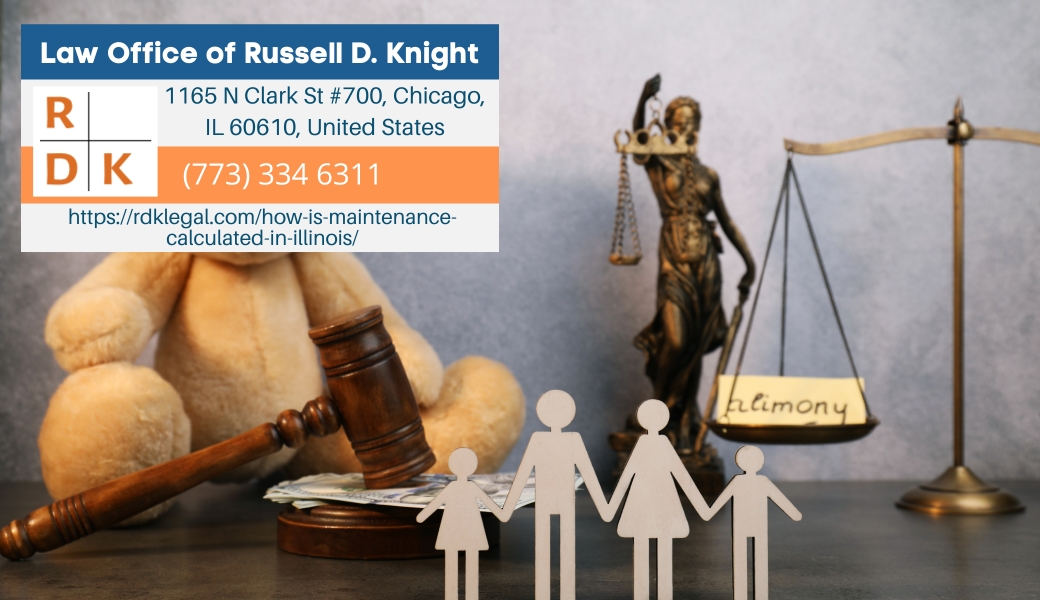Illinois divorce lawyer Russell D. Knight (https://rdklegal.com/how-is-maintenance-calculated-in-illinois/) of the Law Office of Russell D. Knight, provides a clear explanation of how maintenance—formerly known as alimony—is determined during divorce proceedings in Illinois. In a detailed article, Knight addresses the key considerations that courts evaluate when deciding if and how much maintenance should be awarded.
For anyone navigating a divorce in Illinois, one of the most important questions is whether maintenance will be granted. Illinois divorce lawyer Russell D. Knight explains that courts first assess whether any maintenance is appropriate by looking at multiple factors defined in state law. These include income, assets, health, education, and the roles each spouse played during the marriage. According to Knight, the law outlines fourteen separate factors, one of which is “any other factor that the court expressly finds to be just and equitable,” making it highly likely that a court will find some form of maintenance is warranted.
Russell D. Knight, an Illinois divorce lawyer based in Chicago, outlines three possible outcomes for maintenance calculations. One is that no maintenance is awarded. The second is a formulaic calculation where the amount is based on the difference between 33% of the payor’s net income and 25% of the payee’s net income, as long as the result doesn’t exceed 40% of the couple’s combined income. The third option allows the court to determine an amount based on the specific circumstances of the divorcing couple.
In his article, Knight writes, “With 14 possible reasons to award maintenance (one of which is ‘any other factor’), you have a 99% chance that an Illinois divorce court will find that maintenance is appropriate in your Illinois divorce case.” He goes on to explain that once a court decides maintenance is warranted, the next step is determining whether to apply the standard formula—called “guidelines maintenance”—or to issue a non-guidelines award based on the unique details of the case.
The court typically applies the guidelines formula unless there is a reason not to. Russell D. Knight highlights that certain conditions, such as when combined annual income exceeds $500,000 or when a payor has other significant obligations, may allow the court to deviate from the standard method. In such cases, the court may grant a different maintenance amount, provided that the reasons for the deviation are clearly stated and supported by evidence.
The article also discusses maintenance modification after a divorce is finalized. Illinois law permits adjustments to maintenance when there is a “substantial change in circumstances,” such as a change in income or employment status. In these cases, the court can recalculate the maintenance amount, possibly applying a different approach than the one originally used. Knight points out that while courts often default to the original guidelines, there is no requirement that they must continue to do so.
Throughout the article, Russell D. Knight emphasizes clarity and simplicity in navigating what can be a complex legal process. He frames the conversation around what divorcing individuals are most concerned with: whether they will have to pay or receive maintenance, how much it might be, and how it could change in the future.
For people considering divorce in Illinois, understanding how maintenance is calculated is essential to making informed decisions. Russell D. Knight provides a straightforward resource that breaks down the legal standards into understandable terms. By explaining the law and its applications, Knight aims to help clients prepare for what lies ahead in their divorce process.
This article serves as a useful tool for anyone in Illinois facing the uncertainties of divorce and needing practical information about financial support after separation. Russell D. Knight encourages those unsure about their potential maintenance obligations to seek clarity early in the divorce process.
Anyone seeking more insight into how maintenance might apply to their situation can benefit from reading the full article or speaking with Russell D. Knight directly at the Law Office of Russell D. Knight.
About Law Office of Russell D. Knight:
The Law Office of Russell D. Knight is a Chicago-based family law practice focused on Illinois divorce and maintenance law. Led by Illinois divorce lawyer Russell D. Knight, the firm offers legal guidance grounded in a clear understanding of state statutes and local court rules. Russell D. Knight provides straightforward, practical advice for those facing divorce, parenting, or financial support challenges in Illinois.
Embeds:
Youtube Video: https://www.youtube.com/watch?v=VJt15jqTYvQ
GMB: https://www.google.com/maps?cid=13056420905624162796
Email and website
Email: russell@rdklegal.com
Website: https://rdklegal.com/
Media Contact
Company Name: Law Office of Russell D. Knight
Contact Person: Russell D. Knight
Email: Send Email
Phone: (773) 334-6311
Address:1165 N Clark St #700
City: Chicago
State: Illinois 60610
Country: United States
Website: https://rdklegal.com/

